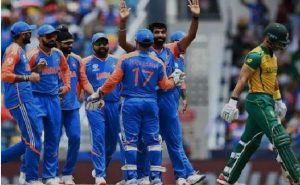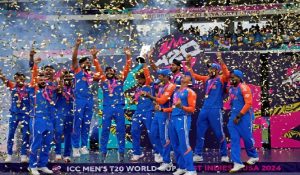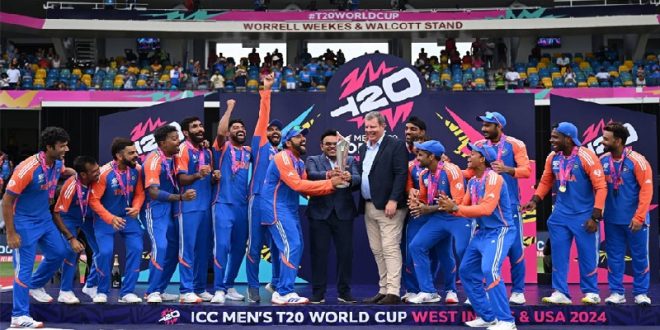India becomes new champion of T20 World Cup 2024
30-06-2024
Bureau Report + Agencies
BARBADOS/ NEW DELHI: The two best sides of the tournament, both undefeated, engaged in a cracker of a final at the T20 World Cup Final at Bridgetown, Barbados. Fortunes fluctuated. With five overs to go, South Africa were at the brink of a cakewalk. Then followed two overs of uncanny brilliance from the best bowler of the world. Knowing they needed to just survive the last Jaspreet Bumrah burst, dead bats were offered, but the champion still managed to break through. In the final stages, a desperate heave was grasped, released, and held again as Surya Kumar Yadav stepped out of the arena and back, making a magnificent catch under pressure look easy. India triumphed, and did so against a gallant opponent, with spectacular skills. It hardly gets better than this.
 Consider, too, that the three Indian spinners conceded 106 runs in their nine overs, picking up just one wicket. There have been accusations aplenty during the past weeks of Indian financial clout coming into play, tampering with the tournament structure, and match timings but, at least no one can accuse the champions of tampering with the conditions.
Consider, too, that the three Indian spinners conceded 106 runs in their nine overs, picking up just one wicket. There have been accusations aplenty during the past weeks of Indian financial clout coming into play, tampering with the tournament structure, and match timings but, at least no one can accuse the champions of tampering with the conditions.
Kensington Oval is not one of their favorite grounds. The semi-final win against England had seen spinners running riot in Guyana. In the final, the fast men ended with figures of 11-0-58-7. Rohit Sharma and Surya Kumar Yadav had been the batting heroes of the semi-final. Here the men who propped up a shaky Indian innings were Virat Kohli and Axar Patel.
It is quite fair to say that the strongest all-round side emerged the victors.
Yes, it is true that the matches involving India were played in the mornings so that the Subcontinental eyeballs could be glued to the games during prime time but then the Subcontinent does provide the greatest proportion of fans and, by some distance. It is not really a commercially viable proposition to have the Indian team play when most of the fans are engaged in eking out a living. Unpalatable it might be, such scheduling is an economic inevitability.
If we look back a few decades, things were skewed in a different way. The small island, from where most of the accusations and complaints keep reverberating these days, hosted the first three major ICC World Cups from 1975 to 1983. They did not just monopolize prime time, they monopolized the game.
 When, in 1984, India and Pakistan made a winning bid for the 1987 edition, Charles Palmer, president of TCCB, had to admit: “England has never claimed that the World Cup is England’s divine right for all times to come” but then in early 1993, India, Pakistan and Sri Lanka won the bid to host the 1996 World Cup. That led Christopher Martin-Jenkins, cricket writer and future president of the MCC, to fume: “There was a time, before money and politics entered the equation, when the community of cricket nations looked no further than the United Kingdom to stage the World Cup”.
When, in 1984, India and Pakistan made a winning bid for the 1987 edition, Charles Palmer, president of TCCB, had to admit: “England has never claimed that the World Cup is England’s divine right for all times to come” but then in early 1993, India, Pakistan and Sri Lanka won the bid to host the 1996 World Cup. That led Christopher Martin-Jenkins, cricket writer and future president of the MCC, to fume: “There was a time, before money and politics entered the equation, when the community of cricket nations looked no further than the United Kingdom to stage the World Cup”.
Those had still been days when England and Australia, as founder-members of the ICC, enjoyed veto powers. Members in “the community of cricket nations” were arbitrarily chosen. Pakistan played their first Test in 1952. England vehemently opposed granting Zimbabwe Test status in 1992. During the interim 40 years, only Sri Lanka stepped into the Test arena. International cricket was run as an elite club where membership was a function of whimsy.
Eight teams participated in each of the first four World Cup tournaments, extending to nine when South Africa returned to the fold in 1992. The inaugural T20 World Cup of 2007 had 12 participating teams. All these tournaments were called ‘World Cups’, although the ‘World’ bit was more than a stretch.
 Pressmediaofindia
Pressmediaofindia




